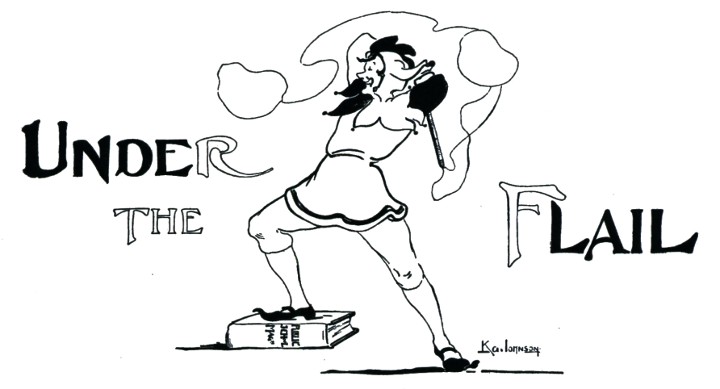Public School Magazine, November 1901

AS my readers will have seen from the society papers I have lately altered my address. The eye of the visitor who enters my present sanctum is instantly struck by a change—what change he cannot at first detect. There are the same works of art on the walls, the genuine “R.N.P.” over the mantelpiece, the autograph photo of the Editor of this journal (as he appeared in the character of Shakespeare at the Duke of X’s fancy-dress ball), the complete sets of Conan Doyle, Anstey, and Jacobs, and the sampler worked in childhood’s happy hours by a relation of the landlady. But there is something missing. Then suddenly it flashes upon the visitor. There are no schoolbooks.
In the suite of apartments which I inhabited before my present ones, schoolbooks were everywhere. The floor was carpeted with slim, green Vergils and blue Horaces. A Liddell and Scott loomed portentiously in a far corner. The place was stiff with dead literature.
I abandoned that section of my library without regret, by the simple process of not packing it. By this time, probably, it is scattered to North and South, to East and West, and priceless classics written by giants of the past and illustrated freely by J. Point (and each copy bearing the autograph of that celebrity) are offered to an unappreciative public at twopence a-piece (slightly soiled), or even a penny.
For my part, as I have said, I was glad to get rid of them. They haunted me, and reminded me of all the knowledge I had once possessed, which is now no more, and which, if I know it, will never, never return.
It is a little wrench finally to abandon any link that connects us with our old school; but, if there is any link which I would prefer to have severed rather than any other link, this link is that link. (An annotated and explanatory edition of this remark is in the press, and will appear shortly before Christmas.)
School-books recall old memories. One can trace the progress of one’s school career by means of them. The “Easy Exercises in Greek Composition” (ugh!) of our unregenerate junior school days lead to Vergils and Livys with notes and vocabulary complete in one volume, a notable aid to study these, for by keeping a finger at the proper place many difficulties could be avoided. These in their turn give way to Greek plays, Euripides and Sophocles, chiefly, Aeschylus being considered too difficult. This is the turning-point. Culture and “sound scholarship” now begin to show themselves. It is not enough at this stage merely to be able to translate the lesson; you must know the notes and be prepared to give Professor Donnerundblitzendorf’s profound excursus on line 33, and to describe the feelings of Herr Rotterdorp when he read same. And then comes the last stage of all, when we turn up our noses at lesser men and keep up a wretchedly thin pretence of thinking Jebb’s notes on the something-or-other really fine, and life becomes a consistent, untiring effort to “improve one’s book-learning and be a scholard.”
And yet there are pleasant memories, too. That Roman history recalls a fascinating round-game played by the form of which I once was a member. The master used to set “slips” on the day’s lesson, full of subtle questions such as “Why did Hannibal do what he did on the occasion when who did what on the banks of which river?” and “what were the words uttered by who when what happened to whom?” In short, a species of missing-word competition. But the beauty of the system was this: After each question he would read out the answer. I am afraid he trusted too much to the honesty of the form. At the age of seventeen it is not dishonest to crib if you do not gain private advantage thereby. In other words, if the whole form crib equally, nobody is any the worse, for everybody is equal. It is simply a case of the relative values of the words “right” and “wrong.” If everybody agrees to call “wrong” “right,” then, relatively speaking, wrong becomes right. (I wonder, to quote Barry Pain, if you know how remarkably easy it is to write like this?) But, reverting to the Roman History, it was a pleasant game, whatever its moral demerits, and the face of the master when everybody gave up full marks at the end of the hour was a study in conflicting emotions.
Mingling with the school-books of our more advanced years lurk surreptitious and insidious translations, the Bohns, as it were, of a dead past. Also sundry works by one Dr. Giles, wherein Greek plays are translated word for word. But these are on the master’s index expurgatorius, and as such are no fit subject for a writer, whose one wish is that through his every sentence a silvery thread of moral should meander. To echo the bard, “the word for our guidance is mum.”
Jack Point.
Editor’s notes:
R.N.P.: Almost certainly a painting or drawing by R[alph] Noel Pocock (1878–1949), illustrator of “The Prize Poem”, “L’Affaire Uncle John”, The Pothunters, and two 1909 Pearson’s Magazine stories by Wodehouse.
Bohns: Henry G. Bohn (1796–1884), London publisher of learned books including libraries of translations of Greek and Latin classics; an example can be seen online. No doubt schoolboys were tempted to use these as shortcuts; see “Treating of Cribs.”
index expurgatorius: list of forbidden books
the word for [y]our guidance is mum: W. S. Gilbert, The Mikado
 Madame Eulalie’s Rare Plums
Madame Eulalie’s Rare Plums